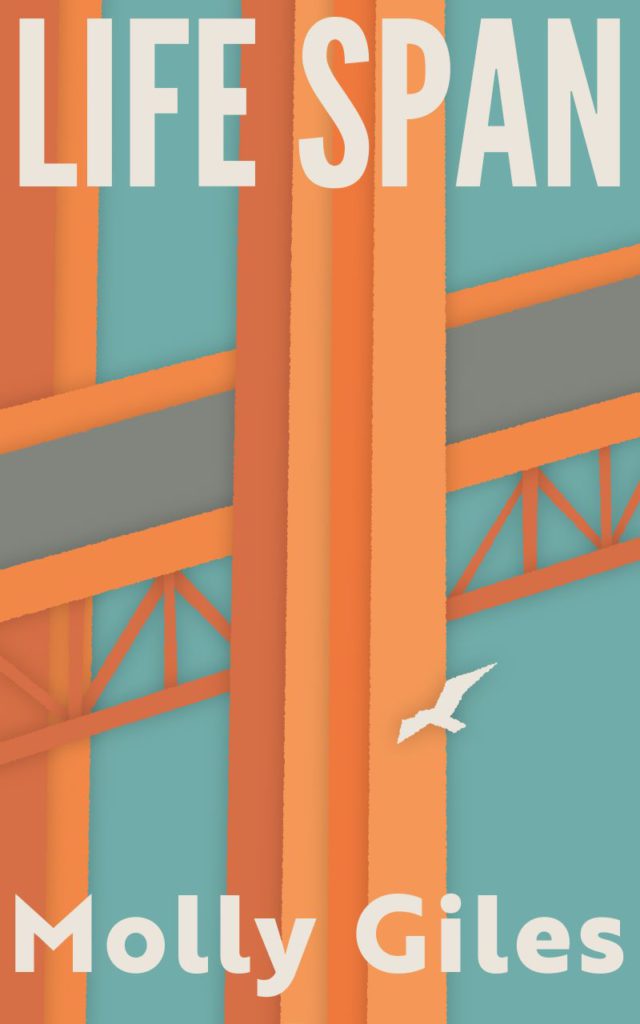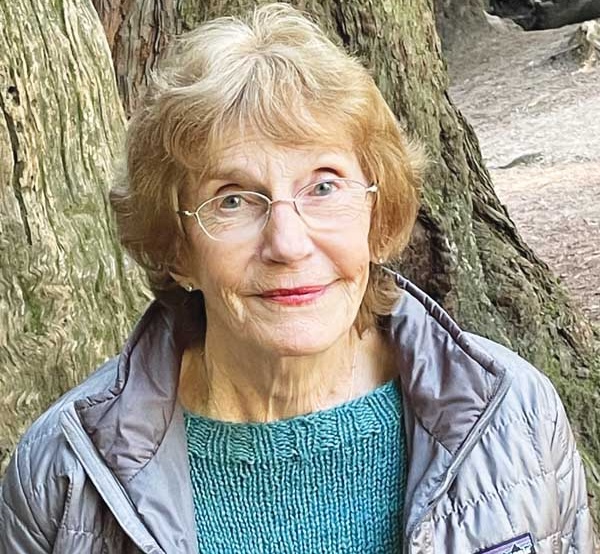Woodacre writer Molly Giles has traveled back and forth across the Golden Gate Bridge for more than eight decades. Those trips dot the diaries she began keeping at age nine.
“My daughters have volunteered happily to burn all these journals when I die. And I thought, well, maybe I should use them before that,” Giles, 82, told me during a recent interview.
Readers will certainly be delighted with that decision, which spawned Giles’ first nonfiction book, an incisive and revelatory memoir released earlier this month. However, the acclaimed writer says her family, ex-husbands and former lovers may not feel as enamored with Life Span: Impressions of a Lifetime Spent Crossing and Recrossing the Golden Gate Bridge.
Throughout Life Span, Giles cleverly uses the iconic structure as the connective tissue for her heart wrenching, humorous and hopeful stories—from her earliest recollections to the present.
For eight or nine years, Giles worked on writing brief scenes from her life, many with the Golden Gate Bridge making an appearance as a bit player. Those wry, penetrating stories form the basis of Life Span. But Giles credits friend, neighbor and fellow writer DB Finnegan—“who gives great advice”—for identifying the landmark as the memoir’s throughline.
“The first piece I wrote was about my grandmother and my mother slapping each other over the 25-cent bridge toll, which is now, what, $10, practically?” Giles shared. “I read it out loud at a reading, and it got a good reception.”
No surprise that people loved the story, which became an early chapter in Life Span. It provides deliciously wicked insight into Giles’ mother, who almost causes a car accident during a petty squabble with her own mother. Never mind the two young girls, Giles and her cousin, being tossed around in the back seat.

Life Span opens in 1945, when Giles’ father returns to his family after serving in the Army during WWII. Giles, then a three year old, gets to ride with her unfamiliar father in the moving van from San Francisco to their new Sausalito home. The little girl marvels at the bridge approach—“it is like entering a tall orange palace with no walls and no roof.” And she likes taking a deep breath of her father’s cigarette smoke, the taste “warm and burnt toasty.”
Although only a tot at the time, Giles vividly recalls the moving day ride and the feelings she experienced. It’s one of her first memories.
“Don’t ask me what I did yesterday, but I did remember that one,” Giles said. “Driving. How proud I felt sitting in the front seat of the truck. And because my father was so new to me, he was shy. The two of us were very shy with each other all the time. So, it was an awkward ride, but a very happy one too.”
Complicated family relationships remain front and center in Life Span. Almost no one is spared from Giles’ razor-sharp observations, including her three daughters, who have decided they won’t read the book.
“It’s probably for the best, but I told them that I wish they told me that when I was writing it,” Giles said. “I could have really taken the gloves off. Most of us don’t write about our parents until they’ve passed away, but I’m writing about people that are still alive. And I feel very vulnerable about it.”
While Giles doesn’t want to hurt anyone, including her exes—who she’s still good friends with—she confesses that her defense may not be good enough. Her goal was to cull through her journals and write honestly about how she felt at the time of the events, rather than how she feels now.
“I want my children to understand that it’s not about them,” Giles said. “It’s about me, you know? It’s all about me. They can write their own Mommy Dearest when they’re finished. But this is more about my inadequacies and my failures.”
It’s easy to relate to Giles’ foibles—and her flash writing, a concise, crisp style that she has mastered in her award-winning fiction. In Life Span, she employs the technique, carefully crafting complete and powerful stories in pithy chapters, some just a paragraph long.
Giles prefers writing flash pieces. The process of “chopping” prose appeals to her, getting rid of the extraneous to expose the deeper meaning.
“To me, it’s a little like play,” Giles explains. “Moving the pieces around the Rubik’s Cube until everything clicks.”
Life Span certainly clicks. From the opening pages about her father and mother, Giles leads us through her marriages, children, lovers, teaching, writing and what she calls the late Summer of Love, when she falls for Ralph at age 75. She keeps the reader engaged by making all the words count.
Each chapter in the book represents a year—usually a single experience in Giles’ life—until she meets Ralph in 2017. She purposely slowed the pace for the reader by devoting 12 chapters to the first year of their relationship, one for every month.
Those 12 chapters have the reader vacillating on whether the couple will make it. Giles told me that she felt the same way while she was living through it. Between her need for alone time and Ralph’s beautiful young female friends, it was a tough call.
“When it comes to dinner, I am happy with a bag of Fritos, eating over the sink, but Ralph is, you know, let’s have meat and potatoes and salad and vegetables,” she told me. “It’s just that before, I could wear the same outfit three days in a row.”
Eventually, Giles’ trepidation waned. Today, their relationship serves as inspiration to her friends looking for love later in life. Ralph keeps his home in San Francisco, and Giles remains in Woodacre, although they spend several days and nights a week together.
The arrangement keeps both Giles and Ralph traveling across the Golden Gate Bridge on a regular basis. And I can’t think of a better beginning for their next chapter.
Upcoming Events With Molly Giles
In conversation with Peg Alford Pursell
- 6pm, Saturday, June 29
- Books & Letters, 14045 Armstrong Woods Rd., Suite B, Guerneville
In conversation with Jane Ciabattari
- 7pm, Thursday, July 18
- Copperfield’s, 775 Village Ct., Santa Rosa










Eagerly awaiting for my library copy (they purchased it for their collection) to arrive! Long ago Molly was my teacher at SFSU and continues to be a lofty inspiration to many of us fledgling writers and polished ones alike.